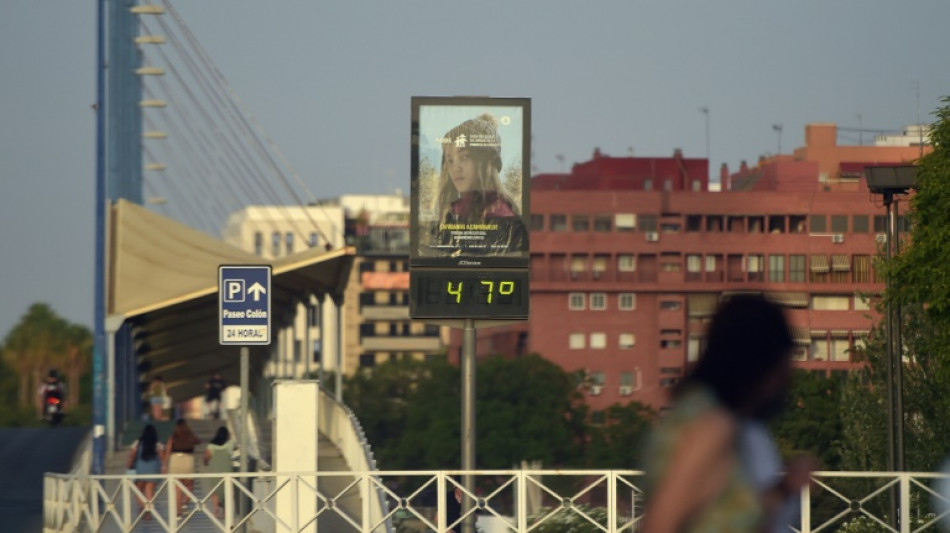
-
 Luxury Western goods line Russian stores, three years into sanctions
Luxury Western goods line Russian stores, three years into sanctions
-
Wallace and Gromit return with comic warning about AI dystopia

-
 Philippine military says will acquire US Typhon missile system
Philippine military says will acquire US Typhon missile system
-
Afghan bread, the humble centrepiece of every meal

-
 Honda and Nissan expected to begin merger talks
Honda and Nissan expected to begin merger talks
-
'Draconian' Vietnam internet law heightens free speech fears

-
 Israeli women mobilise against ultra-Orthodox military exemptions
Israeli women mobilise against ultra-Orthodox military exemptions
-
Asian markets track Wall St rally as US inflation eases rate worries

-
 Tens of thousands protest in Serbian capital over fatal train station accident
Tens of thousands protest in Serbian capital over fatal train station accident
-
Trump vows to 'stop transgender lunacy' as a top priority

-
 Daniels throws five TDs as Commanders down Eagles, Lions and Vikings win
Daniels throws five TDs as Commanders down Eagles, Lions and Vikings win
-
'Who's next?': Misinformation and online threats after US CEO slaying

-
 Only 12 trucks delivered food, water in North Gaza Governorate since October: Oxfam
Only 12 trucks delivered food, water in North Gaza Governorate since October: Oxfam
-
Melrose Group Publicly Files Complaint to the Ontario Securities Commission

-
 Langers edge Tiger and son Charlie in PNC Championship playoff
Langers edge Tiger and son Charlie in PNC Championship playoff
-
Explosive batsman Jacobs gets New Zealand call-up for Sri Lanka series

-
 Holders PSG edge through on penalties in French Cup
Holders PSG edge through on penalties in French Cup
-
Slovak PM Fico on surprise visit to Kremlin to talk gas deliveries

-
 Daniels throw five TDs as Commanders down Eagles
Daniels throw five TDs as Commanders down Eagles
-
Atalanta fight back to take top spot in Serie A, Roma hit five

-
 Mancini admits regrets over leaving Italy for Saudi Arabia
Mancini admits regrets over leaving Italy for Saudi Arabia
-
Run machine Ayub shines as Pakistan sweep South Africa

-
 Slovak PM Fico on surprise visit to Kremlin
Slovak PM Fico on surprise visit to Kremlin
-
Gaza rescuers say Israeli strikes kill 35

-
 'Incredible' Liverpool must stay focused: Slot
'Incredible' Liverpool must stay focused: Slot
-
Maresca 'absolutely happy' as title-chasing Chelsea drop points in Everton draw

-
 Salah happy wherever career ends after inspiring Liverpool rout
Salah happy wherever career ends after inspiring Liverpool rout
-
Three and easy as Dortmund move into Bundesliga top six

-
 Liverpool hit Spurs for six, Man Utd embarrassed by Bournemouth
Liverpool hit Spurs for six, Man Utd embarrassed by Bournemouth
-
Netanyahu vows to act with 'force, determination' against Yemen's Huthis

-
 Mbappe back from 'bottom' as Real Madrid down Sevilla
Mbappe back from 'bottom' as Real Madrid down Sevilla
-
Ali hat-trick helps champions Ahly crush Belouizdad

-
 France kept on tenterhooks over new government
France kept on tenterhooks over new government
-
Salah stars as rampant Liverpool hit Spurs for six

-
 Syria's new leader says all weapons to come under 'state control'
Syria's new leader says all weapons to come under 'state control'
-
'Sonic 3' zips to top of N.America box office

-
 Rome's Trevi Fountain reopens to limited crowds
Rome's Trevi Fountain reopens to limited crowds
-
Mbappe strikes as Real Madrid down Sevilla

-
 'Nervous' Man Utd humiliated by Bournemouth
'Nervous' Man Utd humiliated by Bournemouth
-
Pope again condemns 'cruelty' of Israeli strikes on Gaza

-
 Lonely this Christmas: Vendee skippers in low-key celebrations on high seas
Lonely this Christmas: Vendee skippers in low-key celebrations on high seas
-
Troubled Man Utd humiliated by Bournemouth

-
 2 US pilots shot down over Red Sea in 'friendly fire' incident: military
2 US pilots shot down over Red Sea in 'friendly fire' incident: military
-
Man Utd embarrassed by Bournemouth, Chelsea held at Everton

-
 France awaits fourth government of the year
France awaits fourth government of the year
-
Germany pledges security inquest into Christmas market attack

-
 Death toll in Brazil bus crash rises to 41
Death toll in Brazil bus crash rises to 41
-
Joshua bout only fight left for beaten Fury says promoter Hearn

-
 Odermatt stays hot to break Swiss World Cup wins record
Odermatt stays hot to break Swiss World Cup wins record
-
Neville says Rashford's career at Man Utd nearing 'inevitable ending'


Every heatwave enhanced by climate change: experts
All heatwaves today bear the unmistakable and measurable fingerprint of global warming, top experts on quantifying the impact of climate change on extreme weather said Wednesday.
Burning fossil fuels and destroying forests have released enough greenhouse gases into the atmosphere to also boost the frequency and intensity of many floods, droughts, wildfires and tropical storms, they detailed in a state-of-science report.
"There is no doubt that climate change is a huge game changer when it comes to extreme heat," Friederike Otto, a scientist at Imperial College London's Grantham Institute, told AFP.
Extreme hot spells such as the heatwave that gripped South Asia in March and April are already the most deadly of extreme events, she added.
"Every heatwave in the world is now made stronger and more likely to happen because of human-caused climate change," Otto and co-author Ben Clarke of the University of Oxford said in the report, presented as a briefing paper for the news media.
Evidence of global warming's impact on extreme weather has been mounting for decades, but only recently has it been possible to answer the most obvious of questions: To what extent was a particular event caused by climate change?
The most scientists could say before is that an unusually severe hurricane, flood or heatwave was consistent with general predictions of how global warming would eventually influence weather.
News media, meanwhile, sometimes left climate change out of the picture altogether or, at the other extreme, mistakenly attributed a weather disaster entirely to rising temperatures.
With more data and better tools, however, Otto and other pioneers of a field known as event attribution science have been able to calculate -- sometimes in near realtime -- how much more likely or intense a particular storm or hot spell has become due to global warming.
- Courtroom evidence -
Otto and colleagues in the World Weather Attribution (WWA) consortium, for example, concluded that the heatwave that gripped western North America last June -- sending temperatures in Canada to a record 49.6 C (121 F) -- would have been "virtually impossible" without human-induced climate change.
A heatwave that scorched India and Pakistan last month is still under review, Otto told AFP, but the larger picture is frighteningly clear.
"What we see right now in terms of extreme heat will be very normal, if not cool, in a 2-degree to 3-degree Celsius world," she said, referring to average global temperatures above preindustrial levels.
The world has warmed nearly 1.2C so far.
That increase made record-setting rainfall and flooding last July in Germany and Belgium that left more than 200 dead up to nine times more likely, the WWA found.
But global warming is not always to blame.
A two-year drought in southern Madagascar leading to near famine conditions attributed by the UN to climate change was in fact a product of natural variability in the weather, experts reported.
Quantifying the impact of global warming on extreme weather events using peer-reviewed methods has real-world policy implications.
Attribution studies, for example, have been used as evidence in landmark climate litigation in the United States, Australia and Europe.
In one case set to resume later this month, Saul Luciano Lliuya v. RWE AG, a Peruvian farmer is suing the German energy giant for the costs of preventing harmful flooding from a glacial lake destabilised by climate change.
A scientific assessment entered into evidence concluded that human-caused global warming is directly responsible for creating a "critical threat" of a devastating outburst, putting a city of some 120,000 people in the path of potential floodwaters.
B.Finley--AMWN



